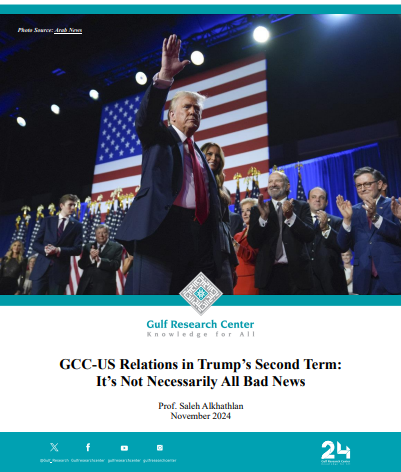Select any text and click on the icon to listen! ByGSpeech
ByGSpeech
 ByGSpeech
ByGSpeech ByGSpeech
ByGSpeech
If President Donald Trump’s first term is any indication of the future trajectory of US-GCC relations, a certain degree of optimism in the outlook for his second term seems fitting. After all, during the previous term, relations between the two sides in areas like regional security, economic cooperation, and addressing shared challenges saw significant progress.
One of the most promising indicators of the future of US-GCC relations was President Trump’s decision to make Saudi Arabia his first foreign visit destination in 2017. The visit went beyond symbolism, resulting in significant defense and economic agreements that bolstered the US-GCC partnership, particularly with Saudi Arabia. It underscored the administration’s commitment to strengthening partnerships with the GCC states—a trend likely to continue in the second term, with an emphasis on deepening security and economic collaboration.
Another step that boosts optimism was Trump’s withdrawal from the Iran nuclear deal in 2018. This decision reassured Gulf states of Washington’s seriousness in countering Iranian threats. By imposing severe economic sanctions and pursuing a "maximum pressure" policy, Trump aligned closely with GCC priorities in curtailing Iran’s regional influence. This approach is expected to resume in his second term, possibly with stricter measures against Tehran, reflecting a sustained focus on Gulf security.
The improvement in intra-GCC relations was another factor. Unlike his first term, which saw tensions among Gulf states during the Qatar blockade, post-Al-Ula developments have fostered greater cohesion among GCC members. This should enhance their ability to engage collectively with Washington on key regional challenges, presenting a more aligned and cooperative front.
Furthermore, Trump’s potential for greater stability in his policies and decisions during a second term is a hopeful prospect for GCC states. His first term was marked by significant turnover in his administration and abrupt shifts in policy direction. A second term, by contrast, is likely to offer more consistent decision-making, providing Gulf states with predictability and facilitating a stronger, more enduring partnership with the United States.
Another factor underpinning a more positive outlook is Trump’s policy of non-interference in the domestic affairs of GCC countries. As is typical of Republican administrations, Trump’s approach focused on shared strategic interests without pressuring Gulf states on internal reforms. This respect for sovereignty fosters trust between the two sides thereby strengthening their cooperation.
Despite these positive indicators, there still exist critical challenges that could limit the scope of US-GCC relations. One major concern is the potential for escalation with Iran. A second Trump administration might intensify its "maximum pressure" campaign, possibly endorsing more aggressive actions, such as encouraging Israel to strike Iranian nuclear facilities. Such scenarios could create significant friction with some Gulf states, especially given the Saudi rapprochement with Iran mediated by China. The current on-going regional reconciliation has de-escalated tensions and opened new opportunities for economic and security cooperation. A renewed US-Iran confrontation could jeopardize these gains, forcing GCC states to navigate a delicate balance between their strategic partnership with Washington and their efforts to maintain stability with Tehran.
Adding to these concerns is Trump’s ambiguous stance on the 2019 attacks on Saudi Arabia’s oil facilities in Khurais and Abqaiq. While the administration condemned Iran and provided additional military support to Saudi Arabia, it refrained from taking decisive military action against Tehran. This hesitation raised questions among GCC states about the reliability of US commitments to their security. In Trump’s second term, Gulf states hope to see a policy of "Controlled Toughness"—a balanced approach that deters Iran’s aggressive behavior without provoking unnecessary escalation. Such a policy would combine sustained diplomatic and economic pressure with credible security guarantees to protect Gulf interests while preserving the fragile stability achieved through the Saudi-Iranian reconciliation.
Another challenge is Trump’s unconditional support for Israel, which could create friction between the US and GCC states. While some Gulf states have normalized relations with Israel through the Abraham Accords, the unreserved US support for Israel—and the possibility of Trump’s encouragement to the Israeli Netanyahu government to strike Iranian nuclear facilities—has the potential to seriously destabilize the region and strain GCC-US relations. To avoid this and accommodate the Trump administration, the precise conditions for a path to Palestinian statehood as part of a normalization process with Israel, as outlined by Saudi Arabia, could still be subject to further discussion.
Other risks include increased pressure on the GCC states as part of the US focus on China and the Trump administration’s push for unlimited US oil production, which could end up hurting Gulf economies. For the moment, if Trump’s handling of the Gulf during his first term is any indication- -and knowing how well Gulf leaders can manage his business-driven mindset--US-GCC relations could witness positive developments that would allow the security and economic partnerships between the GCC and the US to grow further. Key will be to avoid the potential pitfalls outlined above.
* Prof. Saleh Alkhathlan is a Senior Advisor at the Gulf Research Center (GRC)